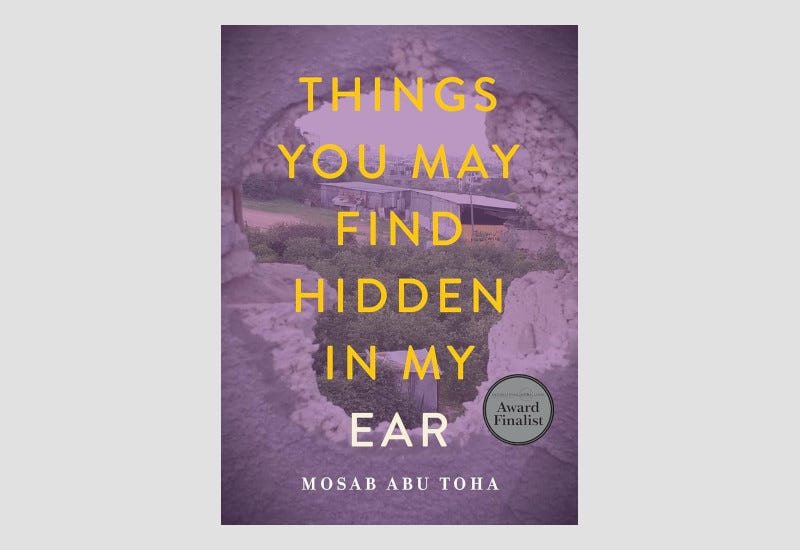BOOK REVIEW: Things You May Find Hidden in My Ear (Poems from Gaza)
By Mosab Abu Toha. City Lights Books, San Francisco. Paperback, 130 pp. US$11
By: Majid Maqbool
Mosab Abu Toha, a young poet and writer from Gaza, was recently awarded the prestigious Derek Walcott Prize for his moving debut poetry collection, Things You May Find Hidden in My Ear: Poems from Gaza (City Lights, 2022). Last year the collection won the 2022 Palestine Book Award, was a finalist for the National Book Critics Circle Award, and won an American Book Award.
The horrific violence that has burst forth on both sides since October 7 makes this slim volume particularly poignant reading.
Born in 1992 in a refugee camp west of Gaza a few months before the Oslo Accords in 1993, the 30-year-old poet in an interview at the end of his poetry collection says that poetry is about “showing your feelings on paper or reciting your poetry to people so that they can feel what you’re feeling.”
Reading his autobiographical poems, one can indeed feel the pain of living in occupation, besieged by the Israeli army, which can strike any target and bomb any building at will. Mosab has lived through the siege in Gaza and has seen his friends die from Israeli strikes. Yet he knows he has no choice other than bearing witness. His lived experiences are evoked through his heartbreaking poetry.
It is like we are living in a grave; we are not dead,
we are going about our daily business, but in a grave.
We are living in place of the dead person.
Mosab shows Gaza as a bruised place under siege where death is imminent and there are more graveyards than homes.
You can’t build a new colony on our graves
-----
Gaza is a city where tourists gather to take
photos next to destroyed buildings or graveyards
-----
In Gaza,
Breathing is a task,
Smiling is performing
plastic surgery
On one’s own face
and rising in the morning,
trying to survive
another day, is coming back
from the dead.
Mosab’s heartfelt poems provide a peek into the lives of besieged people living inside Gaza who are again facing relentless Israeli bombings following the attacks. At least 14,000 Palestinians have been killed in Israeli attacks on Gaza since October 7 and more than 70 percent of Gaza’s inhabitants have been displaced as a result of a nonstop Israeli bombing campaign, according to Palestinian authorities. The death toll in Israel stands at around 1,200 as per Israeli authorities.
Last month, City Lights Books offered Mosab's book as a free digital download “as a gesture of love, a tribute to our dear friend, and in fervent hope for peace.” It is a collection that evokes the broken, traumatized childhood of children in Gaza who are exposed to, and struggle to process, extreme violence and the accompanying loss of lives in Gaza.
In one of the poems, he writes about his son, born in 2015, a year after the 2014 war:
Once he saw a swarm of clouds.
He shouted, “Dad, some bombs. Watch out.”
He thought the clouds were bomb smoke.
Even the nature confuses us.
In another longer poem, A to Z of Palestine, he writes:
It wasn’t raining that day, but I took my umbrella anyway.
When an F-16 flew over the town, I opened my umbrella to hide.
Kids thought I was a clown.
Some of the poems lament about the death of his near and dear ones. In one of the poems in the collection, he remembers his 4th grade teacher who was killed by a nail bomb used by Israelis.
As a child, I never knew
nails could kill people
I thought they were used in
construction
I was fooled.
Despite the violence and the pain and personal losses, Mosab’s poetry also evokes hope amidst hopelessness, and how people summon courage and resilience in the face of tragedies.
In Gaza, you can find a man planting a rose in the hollow space
of an unexploded tank shell, using it as a vase.
Mosab’s well-wishers, readers, and social media followers have been worried of late about his safety following intensified Israeli bombing inside Gaza. There were many days he wasn’t posting anything and there was no way to reach out to him after Israeli authorities cut down the electricity supply and enforced internet shutdown.
His occasional social media posts are brief but bleak, talking about the devastation, pain, and suffering he and his people have had to endure. Just a few days ago he posted on Instagram that he’s still alive. He also informed that a day ago he, his three-year-old son, and his brother-in-law survived death by chance when two bombs fell on a house just a hundred meters away from them.
“Rubble fell on us like a shower of rain,” he wrote, reading like a starting line of yet another grim poem from his besieged homeland. “This needs to stop!!!”

